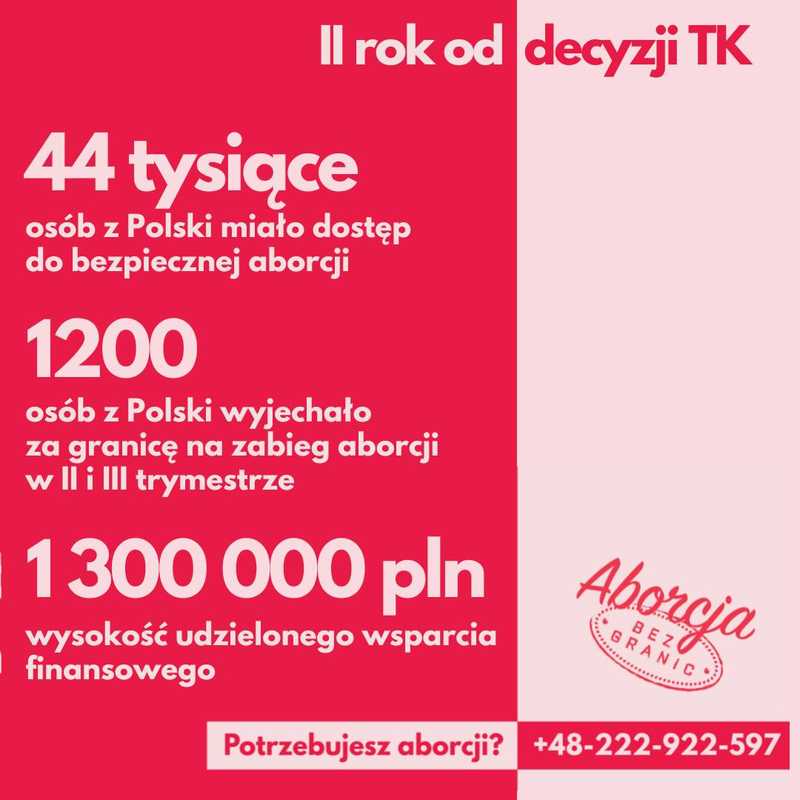Abortion Without Borders helps almost 80,000 people access abortions in place of the Polish state
Two years on from Poland’s decision to effectively ban abortion, members of Abortion Without Borders have supported 78,000 people from Poland to access abortions safely.
In the last year, AWB has helped 44,000 people, with more than 1,200 able to terminate their pregnancies in the second trimester in clinics in other European countries.
Friday 21 October marks two years since a Polish ‘Constitutional Tribunal’ ruled that abortion should be further restricted to no longer include cases of foetal abnormality. Even in cases where it is technically legally permitted (threat to life or health of the parent), it is still essentially inaccessible.
Between 22 October 2021–17 October 2022:
- 6,474 people called the Polish Abortion Without Borders helpline seeking information and access to abortion
- 40% of people who contacted Abortion Without Borders about a second trimester abortion disclosed information about a foetal abnormality
- Members of Abortion Without Borders spent more than Euro 270,000 (1,300,000 Polish zloty) supporting Polish people to get abortions (on procedures in clinics, travel and accommodation, and medical abortion pills)
- Women Help Women gave information to more than 19,000 people from Poland and supported them in self-managed abortion access, and answered more than 90,000 emails
- Kobiety w Sieci helped 6,844 people in the last year, managing an online forum which supports people to safely self-manage their own medical abortions
- Abortion Dream Team supported 9,166 people with a medical abortion, including 147 in the second trimester who were unable to travel to an overseas clinic
- Abortion Network Amsterdam helped 470 people from Poland to access an abortion, and Abortion Support Network helped 361 people
- Ciocia Basia (Germany) and Ciocia Wiena (Austria) each helped 128 people from Poland to access abortions
- The youngest person we helped this year was 14 years old
- The latest pregnancy we helped to terminate was 37 weeks.
Case studies
“Monika”: 19th week of pregnancy. During the amniocentesis at 16 weeks, foetal abnormality was detected, and she was diagnosed with a condition carrying a high risk of haemorrhage and pre-eclampsia. Monika terminated the pregnancy in a Dutch hospital. According to Polish law, Monika should have been able to terminate the pregnancy in Poland.
“Kamila”: 17th week of pregnancy. A scan showed the foetus was developing without a skull and would not survive. Kamila was refused an abortion in Poland. On the way to the Netherlands, she started bleeding heavily in a toilet at a petrol station and had to be transported to a German hospital, where she gave birth to a stillborn foetus in the emergency room. This pregnancy should have been terminated in Poland.
War in Ukraine
Since the beginning of the war in Ukraine, we have been approached by many people who have fled the war. From 1 March to now, we have helped 1,515 women from Ukraine access abortions. The vast majority terminated their pregnancies with pills at home, with only 21 Ukrainian women travelling to a foreign clinic with support from Abortion Without Borders.
Abortion in Poland
In October 2020, a ‘Constitutional Tribunal’ ruled that abortion should be further restricted to no longer include cases of foetal abnormality. Even in cases where it is technically legally permitted (threat to life or health of the parent), it is still essentially inaccessible. In 2021, the Polish state carried out just 107 abortions.
Now, Polish people who need second trimester abortions mainly travel to the Netherlands, Belgium, Spain, France, and the Czech Republic to access care, with many of them arranging the treatment on their own.
At the two clinics in the Netherlands to which we most often send people for second-trimester abortions, 3 to 6 people from Poland terminate their pregnancies every day.
Polish pro-abortion organisations such as Abortion Dream Team are campaigning for accessible abortion on demand across Poland, while facing legal intimidation through the case against Justyna Wydrzyńska. Justyna is facing up to three years in prison for the intent to help someone access abortion pills in 2020, with the trial continuing in January 2023.
Abortion Without Borders is a grassroots feminist initiative made up of Abortion Dream Team (Poland), Abortion Network Amsterdam (Netherlands), Abortion Support Network (Britain), Ciocia Basia (Germany), Ciocia Wienia (Austria), Kobiety w Sieci (Poland), and Women Help Women (global).
Abortion Without Borders launched on 11 December 2019 to support access to safe abortion for anyone in Poland






